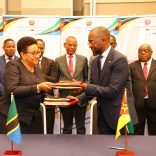Mozambique and Tanzania strengthen defence and security cooperation- Photos
Minister convinced Justice sector will meet targets

Maaseudun Tulevaisuus (File photo) / Minister of Justice, Isac Chande
Mozambican Justice Minister Isaque Chande on Friday said he is convinced that by the end of 2019 the justice sector will be able to assist 250,000 people a year, the target contained in the government’s Five Year Programme for the period 2015-2019.
Speaking at a round table in Maputo with his ministry’s cooperation partners, Chande said that last year the administration of justice had managed to reach 180,000 people, which compares with 170,000 in 2015.
He pointed out that a large number of people, particularly in the rural areas, cannot afford to hire a lawyer. To ensure the constitutional rights of these citizens, notably their right to defence in the courts, the State must ensure legal aid via the National Legal Aid Institute (IPAJ).
“Legal and judicial aid has been growing in such a way that today we can manage to have colleagues from IPAJ in the courts and in the prisons, following up the various phases of cases involving people who have been detained”, said the Minister.
Despite the steps that the administration of justice has taken, Chande said, there are still cases of arrested people who are obliged to travel long distances into another district because there are no courts in the place where they were detained.
He said an effort is underway to implant courts throughout the country, and it was just a matter of time before courts are established n all 161 districts. But where no court yet exists, suspects are tried in the nearest district where there is a court – a situation that Chande recognized is unsatisfactory.
The areas where there is still a critical shortage of courts are the western province of Tete and the northernmost province of Niassa. In addition, courts must be set up in the districts which the Mozambican parliament, the Assembly of the Republic, has recently created in Zambezia, Gaza and Nampula provinces.
Chande said that by the end of this year, another two “palaces of justice” will be built, and should make access to legal services easier for citizens living in these areas. They will join the nine existing palaces, which are places where courts, IPAJ, the prosecution services, and the Criminal Investigation Service are all in the same building.
The two new palaces will be in the northern city of Nampula, and in Guro district in the central province of Manica. The construction of the buildings are nearly complete, and after they have acquired the necessary equipment, they can begin work.
The Minister said that Friday’s round table is an attempt “to share the main achievements in the system for the administration of justice, which have been undertaken with the support of our partners, and to launch a reflection on the challenges faced implementing the sector’s policies and strategy”.
Legal reform, Chande claimed, is bearing fruit. He believed its results are consolidating the institutions of the administration of justice, and safeguarding their independence and autonomy. Increased access to legal aid, and greater efficiency and speed in hearing cases, were allowing citizens to better defend their rights.
The government, he said, had taken measures to train and build the capacity of legal professionals, in areas such as alternatives to imprisonment, cases of people trafficking and kidnapping, and criminal proceedings for dealing with poaching and the illicit trade in wildlife products.
“We have strengthened our intervention strategy”, declared Chande, “and we recommend centring our efforts and synergies on the undertaken to guarantee that justice is within the reach of all, focusing on making effective the rights, duties and fundamental freedoms of citizens”.













Leave a Reply
Be the First to Comment!
You must be logged in to post a comment.
You must be logged in to post a comment.